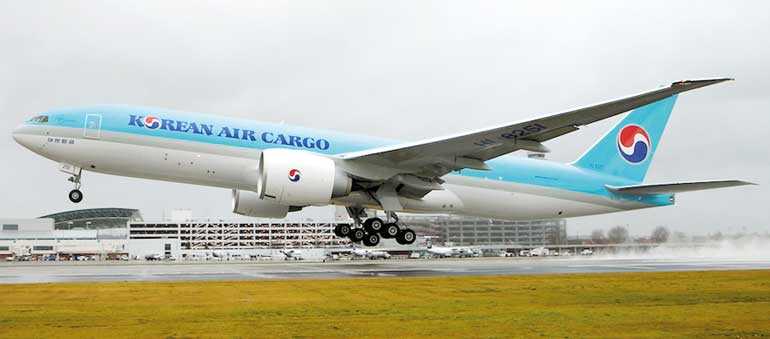Thursday Mar 05, 2026
Thursday Mar 05, 2026
Monday, 16 September 2019 00:26 - - {{hitsCtrl.values.hits}}

Korean Air Boeing 777F
Korean Air has resumed cargo flights to Bangkok, Thailand last month, and to Manila, Philippines in May.
Both flights are operated two times per week with Boeing 777F aircraft.
While Korean Air had previously used passenger aircraft to transport freight on the Manila and Bangkok routes, the demand for air cargo has shown a continuous rise as global companies are shifting their production bases to Southeast Asia.
Against this backdrop, the airline decided to operate dedicated cargo flights on these routes to seize the rising demand of air cargo, including items such as IT devices, automobile parts, and hard disks.
In addition, on 23 August 2019 the airline increased its South America service from two to three flights per week.
The South America- bound B777F departs Incheon and returns to Incheon via Anchorage, Miami, Sao Paolo, Santiago, Lima and Los Angeles. The route is the longest distance among Korean Air flights, taking nearly 70 hours to return to Incheon after departure.
The outbound flight from Incheon will ship mostly manufactured goods such as mobile phone parts and automobiles. In Miami during transit, electronic parts bound for Brazil and aircraft engines will be loaded. The returning freighters are filled with fresh cargo from Chile, Peru bound for Asia such as salmon, cherries, asparagus, mangos and blueberries.
In addition to its route to South America, Korean Air will also focus on exploring overseas cargo markets by actively utilizing the Fifth Freedom, beyond the air cargo demands formed around Korea.
In May 2019, Korean Air expanded its cargo capacity, launching a freighter route between Incheon - China (Xi’an) - Vietnam (Hanoi) and increasing the freighter frequency between Incheon - Vietnam (Hanoi) - India (Delhi) - Europe (Vienna · Milan) from three to four times a week.
The added frequency has expanded air cargo transportation on these routes, carrying items such as mobile phones from Hanoi to Delhi, garments from Delhi to Vienna and Milan, and electronic devices from Xi’an to Hanoi.
To cope with global economic uncertainties such as the prolonged trade dispute between the U.S. and China, Korean Air will continue to strengthen its competitiveness in the cargo business by developing new markets and attracting new demands.